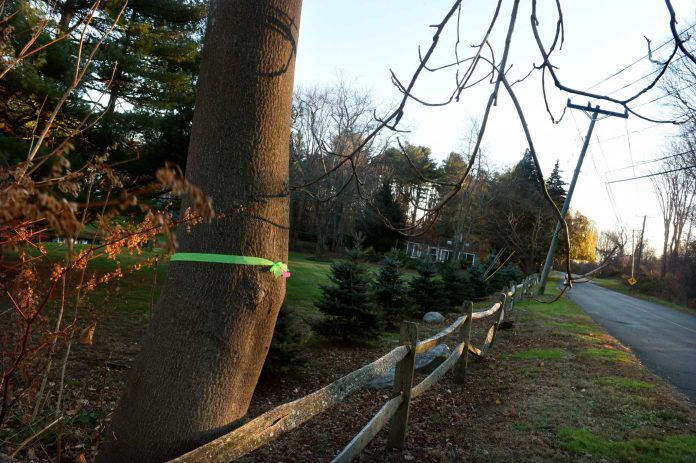MADISON – Eversource is pursuing “increased tree felling” projects in 20 Connecticut cities as part of a data-driven resiliency plan that the utility says is aimed at reducing outages.
In recent years, the utility has faced criticism related to storm-related power outages that have left some customers waiting for days for the lights to come back on. Eversource hopes recent tree felling projects will help better meet regulators’ expectations.
But not everyone is happy with the proposal.
When Barbara Yaeger, a River Road resident in Madison, noticed trees on her street were marked for removal, she initially thought they were just being pruned, she said. She later realized that Eversource planned to remove her entirely. She counted the trees marked and said she had identified several hundred.
Yaeger’s concerns are both ecological and aesthetic.
“It’s a beautifully wooded, historic New England street,” Yaeger said. “And that’s why I moved here.”
Yaeger was among a group of Madison residents who came to a public hearing on Nov. 29 to voice their concerns about the project.
In response to those concerns, Eversource officials have emphasized that the device, which the company operates in the Madison borough, is one of the hardest-hit devices in the state when it comes to tree-related outages.
Sean Redding, manager of vegetation management at Eversource, said the company reviewed three years of outage data to make that decision.
Instead of looking at larger circuits that power multiple cities to formulate its resiliency plan, the utility looked to devices that split the circuit into smaller sections.
They then identified the 50 devices that suffered the most from tree-related outages, Redding said, and based on the results tracked tree-cutting projects in about 20 Connecticut cities.
These cities include Bethel, Bristol, Cheshire, Chester, Clinton, Danbury, Durham, Ellington, Guilford, Mansfield, Middletown, Naugatuck, Newtown, Redding, Sharon, West Hartford, Windham, and Woodstock, according to a list provided by Eversource.
The company has started outreach for the projects in all but one city, Redding said, adding that work has already been done in many of them.
According to Redding, Eversource began researching a data-driven approach after Tropical Storms Elsa and Ida last year.
“Because of the expectations of our customers, the cities and our regulators, we wanted to look at it differently,” Redding said.
When asked how many trees the utility plans to remove as part of the resilience plan, Redding said he didn’t have a specific number. But in Madison and a small portion of Clinton, Eversource has agreements with property owners to remove several hundred trees, he said.
In some cases, the company is offering to plant planting on properties in lieu of removing trees, Redding said, adding that Eversource will also offer tree stump crushing services to some homeowners.
The trees to be removed stand along a one and a half mile stretch of road. According to an Eversource spokesman, the device serves around 3,200 customers there and in the last three years there have been three major outages in this segment.
On average, customers along the segment experienced outages of about three days overall, the spokesman said.
During the tree felling public meeting, two local residents expressed doubts about the accuracy of the figures provided by Eversource. They said they lived in the neighborhood but had never had any major power problems.
Eversource officials told residents that the device had also affected residents outside of the immediate neighborhood.
Neighbor Gerry Aubrey said he understands Eversource is trying to limit the risk of outages, but asked the utility to balance that concern with efforts to preserve the environment.
“As a tariff payer and a resident of the neighborhood, I would ask that some consideration be given,” he said. “Treat our street as you would treat your street.”
“There has to be a balance between protecting the environment and maintaining grid resilience,” Aubrey said.
Meanwhile, members of the Board of Selectmen emphasized that the city only has a say in what happens to trees in the city’s right-of-way.
“This tree felling plan is really much more comprehensive than those that have only been set on city lots,” said First Selectwoman Peggy Lyons. “The decision to fell trees on private property is a private matter between Eversource and the property owner.”
Eversource originally proposed cutting down about 80 city trees, Lyons said, but after the tree warden assessed them, the number was reduced to about 22.
The tree warden considered nine of those trees to be a safety hazard, Redding said, meaning no public hearing was needed before removal.
As for the remaining trees in the city, Lyons told the New Haven Register in a statement that the Board of Selectmen will not vote on the tree felling; Instead, the final decision about the city trees is made by the tree warden.
According to Lyons, Madison requires Eversource to plant three trees for every tree removed. One would end up in the area where the removal took place, while the other two would be given to the city, which would coordinate the planting with the Mad for Trees initiative, she said.
Mad for Trees is a local group that, according to its website, aims to make Madison more sustainable by replacing trees lost to pests, droughts and storms over the past decade.
As of Wednesday, Redding said Eversource had not received an official request from the city about the three-for-one program, but said it was raised during the public hearing.
He expects the moves to begin early this month, he said.
meghan.friedmann@hearstmediact.com
www.nhregister.com
https://www.nhregister.com/news/article/Eversource-energy-tree-removal-madison-environment-17625081.php













